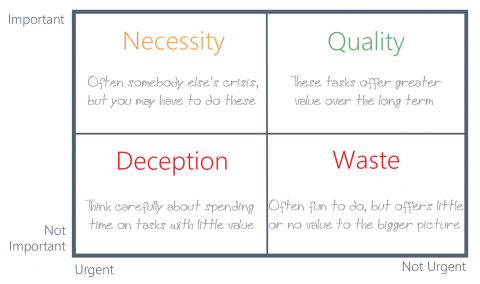No matter what industry you work in, chances are you have periods when you have less to do.
For a lot of us, those quieter times occur routinely over the summer and at Christmas. These are typically the periods when many businesses are focused on covering staff holidays in the short term rather than embarking on longer term goals such as beginning new projects or making contact with potential suppliers. As a result, businesses across all sectors experience a quiet spell.
It’s common to panic at this point: having spare time is an uncomfortable feeling when you know how closely it relates to your bottom line. There’s a temptation to chase after short-term work just to keep busy, regardless of whether it fits your long-term aims.
But there’s a much better way you could continue to be productive during those quieter weeks.
The Eisenhower Matrix
The Eisenhower Matrix, also known as the Urgent vs Important square, is something we look at regularly with clients when we’re talking about productivity. It looks like this:
More often than not, our time is taken up with work in the top left of the board – it is important and it is definitely urgent. Examples might include responding to clients’ needs or customer complaints, picking up new enquiries, giving instructions to your team or sorting out broken equipment. If you don’t complete them, there will be swift consequences: more complaints, a loss of business or unproductive time for your team.
Our natural instinct is to focus most of our time on this side of the square. The sense of urgency skews our perception of what is important and our workflow ends up being crisis-led: we’re constantly firefighting, rather than working strategically.
Often, when things are quieter, the urgent side of the square is taking up less of our time. Our first instinct is to turn to the bottom-right square: the non-urgent and unimportant tasks. Browsing the internet, wondering if you should get a new laptop bag or reading a magazine could all fall into this area. We don’t need to do them now, they’re not contributing to our productivity, but in those rare quiet periods it’s tempting to do something mindless and allow our brains to switch off.
Focus on Important but not Urgent
Instead, try turning your attention to the top right of the square: the important but non-urgent tasks. These are all the things which make a difference to productivity but for which there are no immediate consequences if they aren’t completed.
For example, strategic thinking and planning are often in this square – along with things like going to the gym. They are important to the business, or to your ability to work well, but there is no direct impact if you don’t do them. As a result, they are often put to the bottom of the list.
What’s your matrix?
When the quiet times hit, your first task should be to create your own Urgent vs Important Matrix. Focus on the Important side of the square and use it to be productive in areas that you often overlook because urgency pulls your attention elsewhere.
If you catch yourself saying, “I’d love to do that, but I never have time” – now is that time. Prioritise the tasks you never get around to but which might make a significant difference to your productivity during busier times. Using quiet spells to lay the foundations for a more efficient workflow or a tightly focused strategy will help you reap the rewards when the busier months return.


